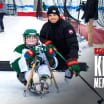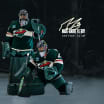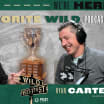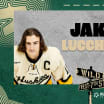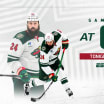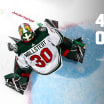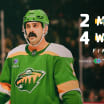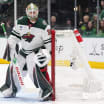DES MOINES, Iowa -- It's been five years since the Minnesota Wild moved its American Hockey League affiliate 935 miles north from Houston, Texas, to the heartland of Iowa.
Houston certainly served its purpose; as the nation's fourth-largest city, there wasn't a shortage of fans to potentially reach. The Aeros had a strong following and a good history in Texas as well.
Iowa Wild benefits from state's under-the-radar hockey tradition
Junior hockey history, growing AHL fan base make for sneaky good experience
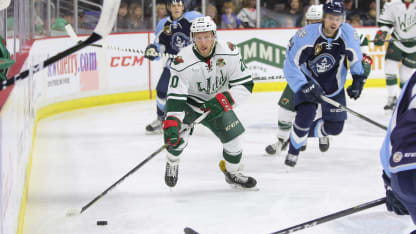
But the opportunity to move its minor leaguers a quick 3 1/2 hour drive south of the parent club was too tempting to pass up, so in 2013, when the Aeros' ownership group, Minnesota Sports and Entertainment, couldn't reach a lease agreement with the arena in Houston, the team was relocated to the Wells Fargo Arena in downtown Des Moines, a city with a rich hockey history of its own.
An inauspicious beginning
Minnesota's agreement to house its minor-league affiliate in the state was not the first between the neighboring states, rivals in almost every other sport.
The North Stars had an affiliation for one season with a Central Hockey League team named the Iowa Stars back in 1969-70. The club, which played its home games in the McElroy Auditorium in Waterloo, finished their lone season in the Hawkeye State with a 35-26-11 record.
Iowa's first glimpse of pro hockey was short. Created as the Memphis South Stars as an expansion team prior to the 1967-68 season, the club played in Tennessee for two seasons before moving to Waterloo. After one year there, the franchise folded.
It truly was the wild, wild west of professional hockey. Wild radio analyst Tom Reid played nine games for Iowa that season, assisting on five goals. And while his short stay in Iowa was less than memorable, the reason why he was sent there is one of the classic old North Star stories.
The team was in the middle of training camp at Wakota Arena (now Doug Woog Arena) in South St. Paul, and coach Wren Blairwas unhappy with the performance on the ice. He singled out Reid and Tommy Williams, then demanded the entire team leave the ice.
As the players skated off, Blair himself went to the bench and threw his stick, but it boomeranged back at him, hitting him right between the eyes, opening him up.
As he laid on the ice, Reid appeared over his coach and began laughing.
"He looked up and saw me, and he blamed me for it," Reid said. "The next day, I was in Waterloo, Iowa."
Reid said he rented a mobile home in Waterloo, expecting to spend a bulk of the season there. But his stay was short, less than a month. And that was a good thing, because by the time he was called back to Minnesota, the water lines to his mobile home had frozen.
"I remember being in the hotel, on the second level, and there was gunfire," Reid said. "So I ran into the bathroom and laid in the bath tub in case any of those bullets came flying my way."
Hockey comes back
More than three decades later, Des Moines was in the professional hockey ranks again, when the Stars (unrelated to the first incarnation) were re-created and served as the Dallas Stars' AHL affiliate. After three years with the Stars, the team was re-branded the Chops and became the Anaheim Ducks' farm team.
Financial difficulties ended Iowa's second run with professional hockey, as the team folded a year later and was sold off to the Texas Stars, who currently operate as Dallas' AHL affiliate in Austin, Texas.
While Iowa has a checkered past with pro teams that have come and gone, its history with junior hockey is practically unrivaled in the entire country.
The country's top junior hockey league, the United States Hockey League, has a strong relationship with the state. Nearly one-third of the 17-team league is based in Iowa, with teams located in Sioux City, Des Moines, Waterloo, Dubuque and Cedar Rapids.
Waterloo (1962), Sioux City (1972) and Des Moines (1980) are the three oldest teams in the league.
Dubuque is one of the league's newest teams, having formed in 2010, but already has a pair of Clark Cup championships to its credit.
Cedar Rapids has been around since 1999, and has one championship; it came in 2005, when a team that featured four future NHLers, including current Wild goaltender Alex Stalock, led the RoughRiders to the title.
Stalock is the only current member of the Minnesota roster to have played for an Iowa-based USHL club, but the team's AHL affiliate is littered with players who have a strong history playing the sport within their current state.
Goaltender Steve Michalek and forwards Pat Cannone and Gerald Mayhew played for the RoughRiders.
Defensemen Hunter Warner and Zach Palmquist and forward Justin Kloos are former Waterloo Black Hawks.
Defenseman Nick Seeler was a Des Moines Buccaneer.
Defenseman Matt Caito was a Dubuque Fighting Saint.
Nearly all of these players went somewhere to play collegiately before settling in with the Iowa Wild, but their returns to the state have been sort of like a homecoming.
"We had a pretty good fanbase in Cedar Rapids," Mayhew said. "There was a lot of good bonds that I made there, and I enjoyed my experience there."
Mayhew, who went on to play at Ferris State University, is from Michigan, which like Minnesota has a strong reputation as a hockey hotbed.
He said he was pleasantly surprised when he arrived in Cedar Rapids for the first time and saw the loyal following the sport had in that area of the country as well.
"Before I got out of high school, I didn't really know very much about the USHL," Mayhew said. "There are five teams in Iowa, and they all get great fans. I was really surprised at first, then I was kind of excited. It made it more exciting to play."
Palmquist, a native of South St. Paul, played 124 games for Waterloo over three different seasons before embarking on a college career at Minnesota State.
Much has changed with Waterloo since Palmquist played his final season there in 2010-11, as he discovered when he went back to the area this summer to help with a futures camp.
"I knew hockey was big when I was there, but going back this summer and seeing how much it's grown, seeing how the community has really embraced the Black Hawks, it was unbelievable," he said.
Following his final season with the Mavericks, Palmquist signed a contract with his home-state Wild and began his pro career right back where his junior career began: in Iowa.
"It was really pretty cool, pretty neat," Palmquist said. "Spending two years in Waterloo then coming back here, I didn't know if I'd ever be living here again after being in Waterloo. But now I've got the opportunity to be in Des Moines, a little bit bigger city, and it's been great to be back."
Building tradition, changing culture
Now five years into its tenure as Iowa's professional hockey team, the AHL Wild has seen a marked increase in the interest in its product. But it hasn't been easy.
Iowa's win-loss record in its first three seasons in Des Moines was among the worst three-year stretches in AHL history. To remedy that, the Wild hired Derek Lalonde as its new coach prior to the 2016-17 season.
Lalonde, a veteran of the collegiate ranks as well as the USHL and ECHL, has won everywhere he has ever coached, including huge turnarounds in his first seasons in both Green Bay (USHL) and Toledo (ECHL).
Things were so bad in Iowa when he took over, Lalonde remembered a story about his introductory press conference.
"You'd have to see it to believe it, but even the security guard was depressed, telling me how bad we were," Lalonde told Wild.com last month. "I ran into a ticket sales person, a marketing person, and they were rolling their eyes."
A tough start to the season didn't help matters, but by last spring, Lalonde had the ship straightened out. Iowa even flirted with postseason contention for bit near the end of the season, but eventually missed the playoffs.
Still, it has raised the expectations in Iowa for the first time since the franchise relocated. Nearly 10,000 fans showed up for the team's season opener in Des Moines.
"I think it was a little momentum from last year. People are excited," Lalonde said. "People are excited with the look of our team, and it was an awesome experience with great energy. It's frustrating we couldn't get a result for them."
Unlike last season, when losses didn't deflate the dressing rooms, the disappointment was palpable after a 5-4 loss to Milwaukee on Oct. 8. A 1-3-0 start to the season is far from a death knell, but it's certainly not what Lalonde and the group had hoped for.
"I want guys to not accept losing. I want them upset on the result, and I think that's a good sign going forward," Lalonde said.
Forward Zack Mitchell, the longest tenured player in Iowa and the franchise's leader in games played, said he's thankful the fans in Iowa have been patient enough to stick by the team in tough times.
It's a group of fans that's loyal, but smart, passionate and understands the budding history of the sport within its borders, one that's built upon each time the Iowa Wild takes the ice.
"When they stick with us like they have, it makes it real easy for us to put in the hard work for them," Mitchell said. "It's certainly not a place that you think of when you say 'hockey hotbed,' but these are people who love sports. There aren't professional sports in the area, and it's a blue collar state. These people love hockey."


